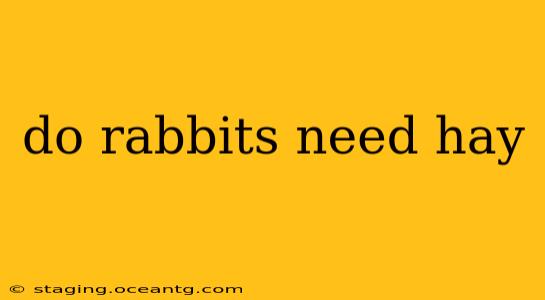Hay is not just a good thing for rabbits—it's absolutely essential for their health and well-being. Without a sufficient amount of hay, your rabbit is at serious risk of developing significant health problems. This comprehensive guide will explore why hay is so crucial, address common questions, and provide tips for ensuring your bunny gets the hay they need.
Why is Hay So Important for Rabbits?
Rabbits have a digestive system specifically designed for a high-fiber diet, and hay is the cornerstone of that diet. It provides the necessary fiber to keep their digestive tract moving smoothly, preventing potentially life-threatening conditions like:
- Gastrointestinal stasis (GI stasis): This is a serious condition where the digestive system slows down or stops completely. It's often fatal if not treated promptly.
- Dental problems: The constant chewing of hay helps to wear down their continuously growing teeth. Without sufficient hay, their teeth can overgrow, leading to pain, difficulty eating, and further digestive issues.
- Obesity: Hay is low in calories and high in fiber, promoting a healthy weight. Without it, rabbits are prone to becoming overweight, which significantly increases the risk of various health problems.
What Kind of Hay Should I Feed My Rabbit?
Not all hay is created equal. The best types of hay for rabbits are:
- Timothy hay: This is a staple for adult rabbits due to its high fiber content and lower calcium levels.
- Orchard grass: Another excellent choice for adults, offering similar benefits to Timothy hay.
- Meadow hay: A good option, often a mix of grasses, but make sure it's high in Timothy or other suitable grasses.
Avoid Alfalfa hay for adult rabbits as it's higher in calcium and protein, which can contribute to obesity and bladder stones. Alfalfa is generally suitable for younger, growing rabbits.
How Much Hay Should My Rabbit Eat?
A good rule of thumb is to provide unlimited access to hay. Your rabbit should always have a plentiful supply available throughout the day and night. The amount they consume will vary depending on size, age, and activity level, but they should always have a fresh supply to graze on.
What if My Rabbit Doesn't Eat Hay?
If your rabbit isn't eating hay, it's crucial to address this immediately. Possible reasons include:
- Dental problems: Overgrown teeth can make it painful to chew.
- Illness: Various illnesses can affect appetite.
- Preference issues: Try different types of hay to find one your rabbit enjoys.
- Stress: Changes in environment or routine can affect eating habits.
Consult your veterinarian if your rabbit refuses to eat hay. Early intervention is key to preventing serious health complications.
Can I Feed My Rabbit Other Things Besides Hay?
While hay forms the foundation of their diet, rabbits can also have limited amounts of fresh vegetables, fruits (in moderation), and rabbit pellets. However, hay should always make up the vast majority of their diet (around 80-90%).
Is There a Difference Between Hay and Grass?
While both are grasses, hay is dried grass. The drying process preserves nutrients and makes it suitable for long-term storage. Fresh grass, while sometimes acceptable as a treat, should never replace hay as the primary food source due to the moisture content and potential for bacterial contamination.
How Do I Store Hay Properly?
Store hay in a cool, dry, and well-ventilated area to prevent mold and spoilage. Use airtight containers or keep it in a clean, covered space to maintain freshness and quality.
By understanding the vital role hay plays in your rabbit's health and following these guidelines, you can ensure your furry friend enjoys a long, happy, and healthy life. Remember, if you have any concerns about your rabbit's diet or health, always consult a veterinarian experienced in rabbit care.
